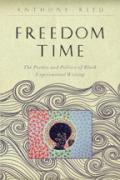
Through extended analyses of works by African American and Afro-Caribbean writers—including N. H. Pritchard, Suzan-Lori Parks, NourbeSe Philip, Kamau Brathwaite, Claudia Rankine, Douglas Kearney, Harryette Mullen, and Nathaniel Mackey—Reed develops a new sense of the literary politics of formally innovative writing and the connections between literature and politics since the 1960s.
Freedom Time reclaims the power of experimental black voices by arguing that, if literature fundamentally serves the human need for freedom in expression, then readers and critics must see it as more than a mere reflection of the politics of social protest and identity formation. With an approach informed by literary, cultural, African American, and feminist studies, Reed shows how reworking literary materials and conventions liberates writers to push the limits of representation and expression.
Excerpt above from The Johns Hopkins University Press.
“The book impressed us with its determination to recast the very notion of freedom in a theoretical sense while, on the local level, showing readers a way into specific poetic works that are often set aside because of their formal difficulty. Its contributions to poetics, to the history of American and Caribbean literature, and to the understanding of black writing will unfold for a long time to come.”
In June 2015, Anthony Reed was awarded the Samuel and Ronnie Heyman Prize for Outstanding Scholarly Publication or Research for Freedom Time.
Above quote is from the Selection Committee of the Samuel and Ronnie Heyman Prize for Outstanding Scholarly Publication or Research, June 2015